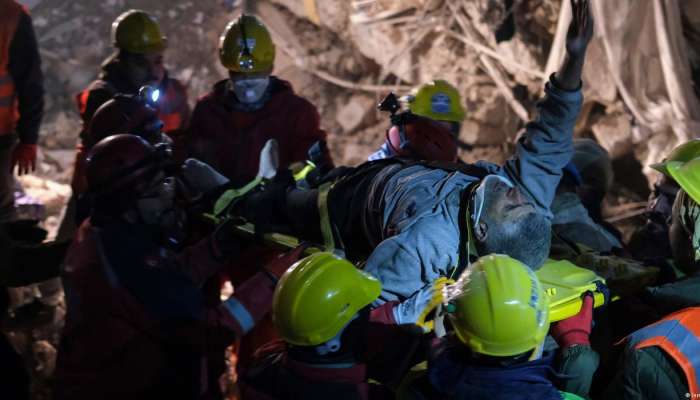
Ankara: Rescuers in Türkiye have pulled more people from the rubble of Monday's earthquakes, but hopes were fading in Türkiye and Syria that many more survivors would be found.
UN relief chief Martin Griffiths has said he expects the death toll to at least double, after he arrived in southern Türkiye on Saturday to assess the quake's damage.
With a death toll of at least 24,517 in Türkiye, the disaster is already in the list of the top 10 deadliest earthquakes ever. More than 3,500 have died in Syria, where death tolls have not been updated since Friday.
Between Monday and Saturday, the area experienced more than 2,000 aftershocks, according to Türkiye's AFAD disaster authority.
Greece's foreign minister, Nikos Dendias, his visiting quake-hit areas neighbouring Türkiye in a show of support.
He was met at the airport by his Turkish counterpart, Mevlut Cavusoglu before they flew to Antakya, where Greek rescuers are helping with search and rescue operations.
Despite a history of rivalry with Türkiye, Greece was among the first European countries to send rescue workers and humanitarian aid a few hours after the disaster.
The Greek government has sent 80 tonnes of medical and first aid equipment.
According to the foreign ministry, Dendias and Cavusoglu will discuss ways Greece can further assist Türkiye.
German rescue worker warns of disease
A German expert and relief worker has warned that the danger of disease is growing in quake-struck areas.
"In regions where people have no access to clean drinking water, there is a risk of epidemics at some point," said Thomas Geiner, a doctor with earthquake experience who is part of a rescue team from Germany's NAVIS aid organisation said.
Bodies trapped under rubble could contaminate the water supply, he warned. The lack of toilets was also a concern.
A Turkish rescuer, who did not provide her full name, described the situation in Antakya as desperate.
"The bodies are all over the roads, with only blankets on them," she said.
People in the town were wearing masks to cover the smell of death.
Germany to offer fast-track visa option for Turkish quake victims
Germany's Foreign and Interior ministries have announced plans to enable Turkish quake survivors who have relatives in Germany to temporarily stay with them.
The two ministries have set up a task force to fast-track the paperwork and reduce the necessary bureaucracy.
"The goal is to make the visa process for these cases as unbureaucratic as possible," said Foreign Minister Annalena Baerbock.
Interior Minister Nancy Faeser said this would be done with regular visas, which would be swiftly issued and remain valid for three months.
"We want to make it possible for Turkish or Syrian families in Germany to bring close relatives from the disaster region to join them without red tape," Faeser wrote on Twitter.
Germany is home to the largest Turkish community outside of Türkiye.
The European Union's envoy to Syria has urged Damascus not to politicise issues of humanitarian aid, rejecting accusations that the bloc had failed to provide sufficient help to Syrians.
"It is absolutely unfair to be accused of not providing aid, when actually we have constantly been doing exactly that for over a decade and we are doing so much more even during the earthquake crisis," Dan Stoenescu told the Reuters news agency.
He said the EU had gathered more than €50 million ($53 million) to provide aid and back rescue missions and first aid in both government-held and rebel-controlled parts of Syria.
A 30-tonne shipment of humanitarian aid from the Italian government — including four ambulances and 13 pallets of medical equipment — landed in Beirut on Saturday en route to Damascus.
The first shipment of earthquake-related aid crossed from Türkiye into Syria's rebel-held enclave on Friday.
Humanitarian access to northern Syria is complicated by the civil war, while sending funds can be blocked or slowed by sanctions, despite an exemption for relief efforts.